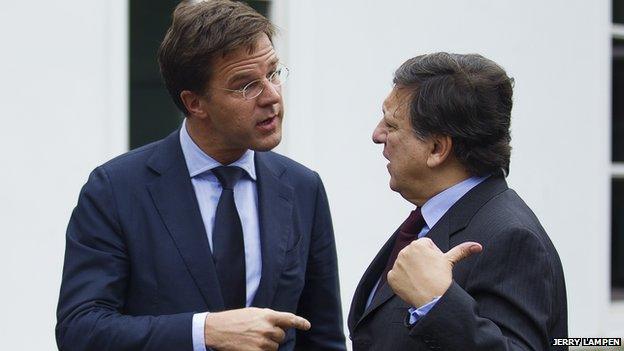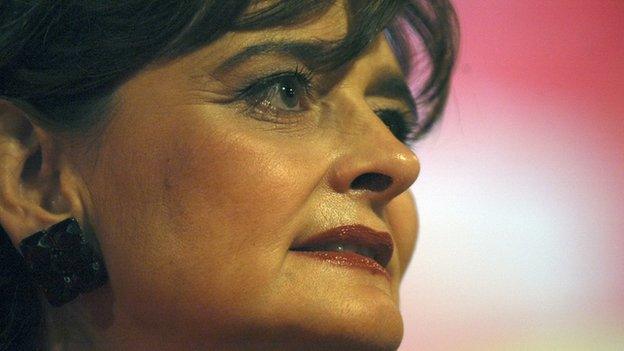Barroso 'used blackmail' to get more female commissioners
- Published

Former Commission president, Jose-Manuel Barroso, (right) exchanges views with Dutch prime minister, Mark Rutte.
The former president of the European Commission says he "used blackmail" to persuade members to put forward female candidates as commissioners.
Jose-Manuel Barroso was speaking, in a jovial mood, to a mainly female audience at the World Economic Forum in Davos.
He said he told prime ministers their country would get fewer important commissioner roles unless they proposed a woman for the job.
"I needed women," he said.
A third of Commissioners must be female.
Mr Barroso said his intervention worked: "That's the power of the president of Commission - to choose the portfolio".
Talent and gender
He outlined the punishment awaiting those who did not take the hint.
If a country proposed a man, instead of offering them oversight of financial markets, competition, energy, or economic affairs, he would offer them a less important position, such as sport.
Gordon Brown was one prime minister he had to persuade to propose a woman instead of a man, pressure that resulted in Baroness Ashton becoming trade commissioner.
"I told Gordon Brown 'I need a woman because I will not make my quota'," he said, before stressing that Ms Ashton was a very talented candidate and did not get the job just because of her gender.
Mr Barroso was part of a panel of speakers discussing a report examining why there were so few women in parliaments around the world. On average, the report said, just one in five elected politicians are women.
Rwanda was a notable exception as its parliament has a majority of female MPs.
Washed up
Cherie Blair, lawyer and wife of the former British prime minister Tony Blair, was also part of the panel.

She said that it was important to change the culture and that quotas were a good start.
"Yes, they're a short term, quick fix, but we should stop apologising for them," she said, before adding that it wasn't just about women, but about men and how they are viewed, said Mrs Blair, who stood for parliament in 1983.
To much amusement she also relayed a story about Tony Blair being the "politician's spouse".
"The ultimate humiliation... we had to talk to my agent about the forthcoming election campaign. At the end of the lunch the agent's wife said to Tony: 'I think we should leave them to talk business. Would you mind coming and helping with the washing up?''